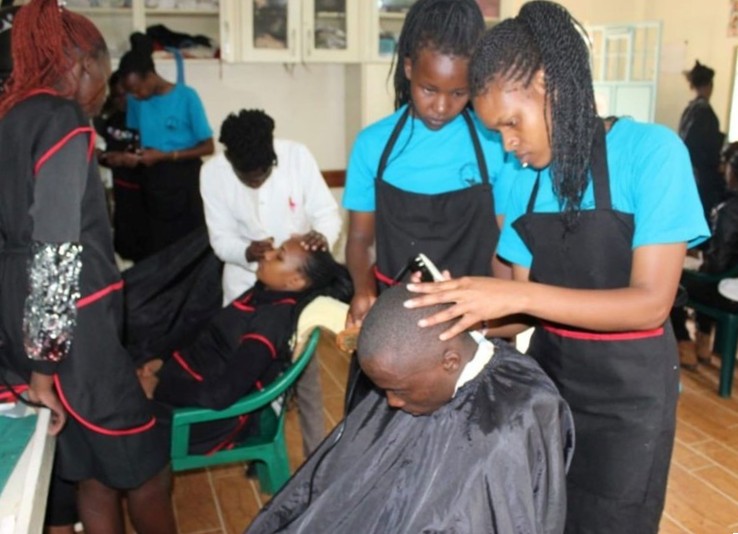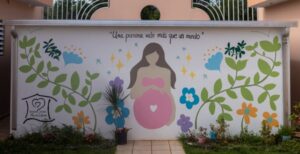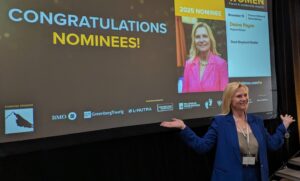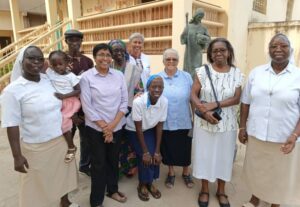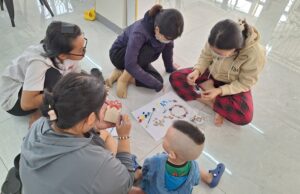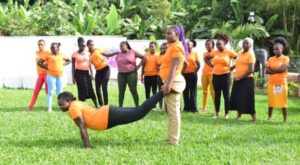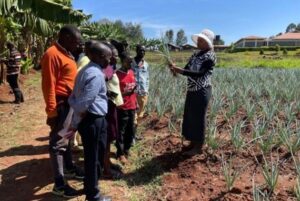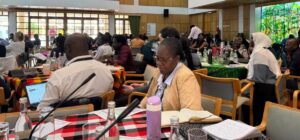By Mourine Achieng, Global Sisters Report
Founded in 2016, the Good Shepherd’s Euphrasia Vocational and Training Institute offers practical skills training to help young people escape cycles of poverty, early marriage, and unemployment. In a recent interview with Global Sisters Report, Director Sr. Justicia Nekesa shares how the center is transforming lives and fostering hope among vulnerable communities.
GSR: Could you share more about the institute and the community it supports?
Nekesa: When we arrived, young people in the informal settlements were mostly affected by drugs, especially bhang (cannabis drink) and alcohol. Prostitution was also very high. It’s still there, but not as rampant as before.
When we first came, we visited the community in the morning, met with the women, and left in the evening. As we left, we would see young girls dressed up and leaving their homes. And when we came back in the morning, we met some of them returning home. We later found out that they were involved in prostitution. Most of these girls were teenage mothers who dropped out of primary school and had to take care of their children. So, they would leave the young ones with their mothers to go to work.
Among the Maasai community, women are the “donkey” of the home. They refer to themselves as such because their labor is akin to how donkeys are put to work, yet [they] gain nothing from their labor. The Maasai women work hard, but the fruits of their labor go to their husbands. Additionally, there was a high school dropout rate due to early marriages.
The girls and women were disempowered. When we established the institution, our goal was to support these women in rebuilding their lives and create something for themselves. Since 2016, we’ve graduated many students. Our skill-based courses also offer opportunities for our beneficiaries beyond formal employment.
If the majority of the students were primary school dropouts, how were they able to learn the courses you offered?
We began with adult literacy classes to enhance their writing and reading skills. Apart from that, our courses are mostly skill-based. Three-quarters of what we teach is practical, which makes it easier to learn. The adult literacy sessions help them to read and write, and a quarter of the curriculum focuses on theory.
Because of their literacy level, some don’t take the National Industrial Trade Authority exams, which have a detailed theory part. However, we offer an internal exam. When they pass, we give them certificates.
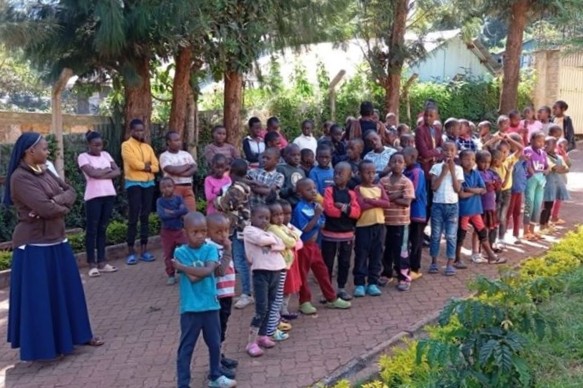
Are students who don’t take NITA exams at a disadvantage?
To some extent, yes. Some employers want students with certificates from the government examination body, but the Euphrasia Vocational Training Institute is a reputable college. We offer internal certification, which the government recognizes. There are also employers in the industries where our students pursue internships who recognize our certification. Plus, the majority of our students who don’t sit for NITA exams opt for self-employment in the various areas of their studies.
Has the profile of students changed over the years?
In recent years, most of our students are from four graduates (equivalent to 12th grade in the United States), as the government has changed its education system to encourage skill-based competency. A good number of young people nearby who don’t qualify for university come here. However, despite having completed high school, a significant number gave birth during their high school years. Some were in and out of school because of drugs or school fees but managed to complete their studies. The majority didn’t perform well in their national exams because of interruptions in their education.
Given the background of some of the students, how do you transition them into formal education?
Our program incorporates life skills and psychosocial support. Every Tuesday morning and Friday afternoon, the students spend two hours in a life skills session. Once a month, we have Mass. After Mass, the priest offers a talk on spiritual issues. We also have a program counselor who offers group counseling once a month. She also counsels individual students, depending on their specific issues.
For our students who have drug problems beyond our program counselor’s expertise, we refer them to the Association of Sisterhoods of Kenya. The AOSK partners with the National Agency for the Campaign Against Drug Abuse. Counselors from NACADA meet the students over the weekend for rehabilitation sessions.
The counseling sessions are quite expensive, and without the sponsorship, they can’t afford them, nor can we. Through this partnership, our students receive free counseling. Our programs are holistic. We want them to graduate as whole and productive members of society.
What sectors or organizations do students typically join after graduation?
Our certificate courses take one year. The first six months are coursework, and the remaining six months are their internship. Our catering students mostly pursue internships at hotels such as Maasai Lodge, Ole Sereni and The Legend, among many others that we’ve partnered with. For those studying hairdressing and beauty therapy and tailoring and dress making, they find opportunities in local beauty parlors and tailoring shops. Still, others open small businesses.
We train our students to be people of integrity and maintain a good reputation, so the next batch of students can also secure internship opportunities. Because of their good behavior, several have secured jobs at the places where they completed their internships.
What support do you offer to students who are unable to secure employment opportunities or start businesses after completing their studies?
We encourage them to find clients and utilize our resources. For example, a hairdressing graduate can bring their clients here and use our hair products, blow dryer, or any other items. Once they’ve served their clients, they pay us a small fee. We have a former student who bakes cookies in our kitchen and sells them to the local shops.
This arrangement is designed to prevent them from becoming disillusioned at home while waiting to start a business or secure employment opportunities. They can start small and grow gradually. In addition, we are exploring the option of providing our graduates with loans to help them start businesses. We have one beneficiary who received a loan from us last year to open a salon.
We also have a fashion and design income-generating project where we creatively design bags using kitenge and leather. We employ our former tailoring and dress-making students in the production. Currently, we’ve employed four, and two more are under training to join the production team.
What are the next steps for the institute?
The institute has done a great job empowering girls, but we realized that when we equip these girls with skills only to return and marry men who are not equally empowered, it undermines our mission. Most men feel threatened when women are educated and can earn a living, while they cannot. They regulate just how much their wives can do with their education. Ultimately, the women are forced to bury their skills and stay at home.
We want to empower the men, too. We’re planning to expand and introduce courses that appeal to men, such as plumbing and electricity. Our current courses mostly attract girls, although we have a few boys.
When both genders are empowered, the change we hope to bring will be long-lasting.
First published in Global Sisters Report on October 14 (access here) and reprinted here with their kind permission.
